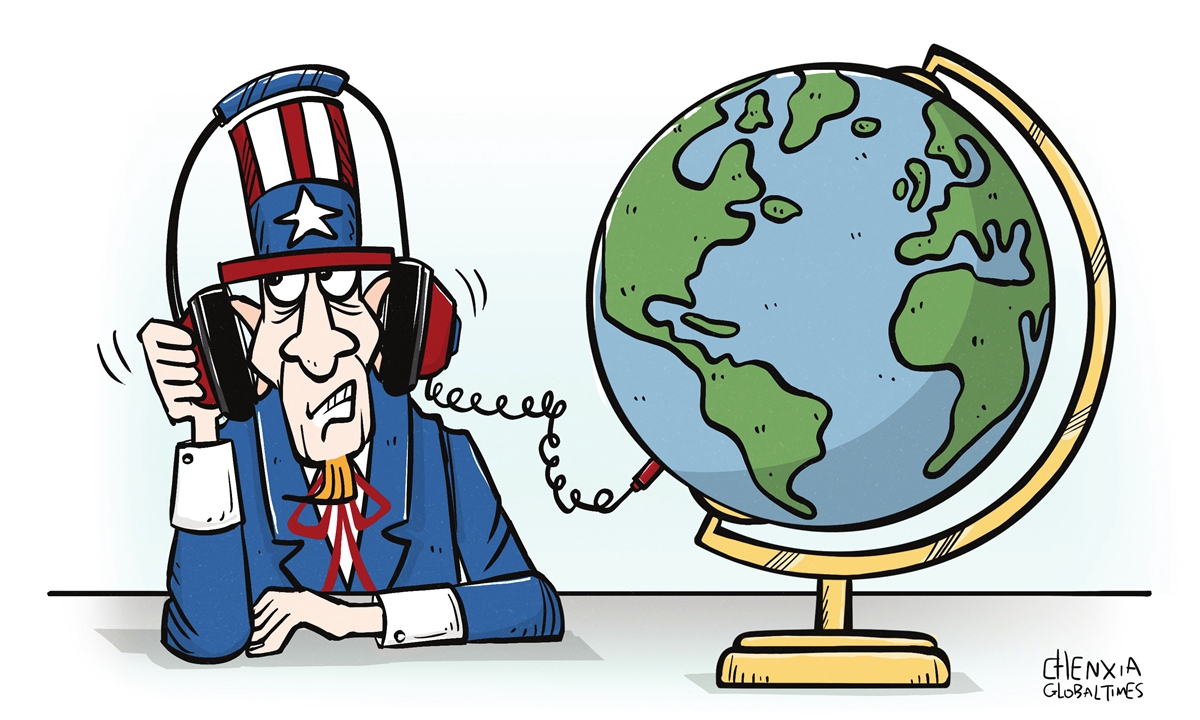

US spy Illustration: Chen Xia/Global Times
US espionage and intelligence agencies that work to infiltrate other countries are complaining to the US media about the difficulties of their malicious undertakings against other countries' national security, in order to convince Washington's politicians and decision-makers to allocate them more resources and money. In other words, they are "pleading poverty," said Chinese experts on intelligence and security affairs on Wednesday.
Due to economic difficulties in the US, American state security agencies like the CIA find their budgets are decreasing, and the cost of conducting espionage in China is also rising. This is why they are "pleading poverty" to the media at present, analysts said.
However, the CIA and other US spy agencies will not give up, and are likely to act more aggressively in future, and China needs to keep strengthening its counterespionage works through not only law-enforcement, but also national security education, and keep up with sci-tech development to understand how cutting-edge technologies work and can be used in intelligence warfare, experts noted.
The Wall Street Journal published an article titled "American spies confront a new, formidable China" on Tuesday, which highlights the necessity and difficulties for the US to spy on China. It recounts the failure of CIA in China about 10 years ago, referring to a report that alleged dozens of US spies were caught in China which caused a "catastrophic setback" of its intelligence network, although the report has not been acknowledged by either nation.
The WSJ quoted a former US intelligence official who said: "We have no real insight into leadership plans and intentions in China at all." The WSJ said the US is still trying to continue its espionage warfare against China on both fronts of "human intelligence" by rebuilding a spy network and a technological one mainly through electronic snooping.
Lü Xiang, an expert on US studies at the Chinese Academy of Social Sciences, told the Global Times on Wednesday that "the report generally says nothing new, but it sends a clear signal that some US officials and media like the WSJ disagree with CIA chief William Burns' previous claim that his agency is making progress in rebuilding spy networks in China."
The reason why US intelligence officials are now stressing the difficulties and necessity of their work is that, just like national defense, "intelligence" is a "lucrative sector" in the US, and many people, even foreign informants, depend on this largesse, which comes with a huge amount of fiscal appropriation and a lack of transparency, analysts said.
But due to the worsening economic situation in the US in recent years, especially rising inflation, US intelligence officials now receive less funding from their government, said a Shanghai-based expert on national security who asked for anonymity. "For instance, some US agents operating overseas now have no enough money to pay rent for their accommodations and venues for events."
"On the other hand, when they try to hire other foreigners to serve them, they find that those foreigners they want to hire want more, and in fact, they have less with which to pay them. In addition, due to the decoupling approaches against China that the Biden administration implemented in recent years, the CIA finds that its human intelligence assets are facing new challenges due to the obstacles for people-to-people exchanges," said the expert.
US' hostility
The WSJ report said "Strengthening the human spy network targeted on China is one goal of a titanic, but mostly secret, shift at the CIA and its sister US spy agencies. It comes amid a larger transformation in US security policy away from fighting insurgencies around the world and toward preparing for a possible 'great power' conflict with China and Russia."
Li Wei, an expert on national security at the China Institutes of Contemporary International Relations, told the Global Times on Wednesday that "Nowadays, the US is prioritizing its Indo-Pacific strategy and the Ukraine crisis, as well as the competition with China, so the CIA will surely prioritize these issues. The US will spend more money to input more personnel and resources to target its major competitors like China and Russia."
However, it does not necessarily mean there will be direct conflict between great powers, but China will certainly face increasing national security threats from the US, Li said. "The CIA and other US spy agencies will try to engage with people in key positions in China, and overseas personnel including students, diplomats and scientists who study or work in other countries will become targets of the US.
Their spies will also try to come to China to recruit assets who work in key positions and in fields like finance and the economy."
China's Ministry of State Security (MSS)in August revealed two cases of CIA espionage activities against China, indicating that China's national security authority cracked CIA attempts to spy on Chinese government employees and officials.
Rapid advances in technologies impact espionage and counterespionage works, Li said. "The rise of AI technology has brought new challenges to us, because the US will also use relevant technologies to serve their espionage activities, The US in recent years is also interested in spying on sci-tech development on China's semiconductor industry."
"Although China has achieved some progress,including legislation and law-enforcement, in countering US espionage activities, the threat still exists and is even increasing," Lü said. "More efforts are needed, including strengthening anti-spy education to cover more people, and to keep up with the sci-tech development to use cutting-edge technology to serve our own national security."
The first training camp of the Center of Innovation and Maritime Excellence, supported by Chinese companies, was opened Thursday in Djibouti City, the capital o...